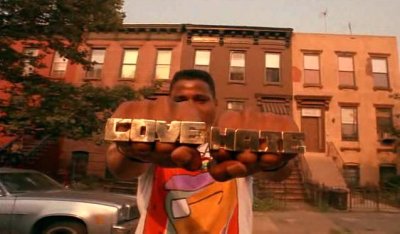← Back to Reviews
in
So, I saw Do the Right Thing a couple of weeks ago, as part of a Netflix-inspired crash course through classic cinema. I've been trying to fill the gaps in my viewing, and this was an obvious selection.
I'm very torn on this film. The cast is great, and the film is crisp and well-directed. The storyline is undeniably compelling, to the point at which I found myself interested in what, in retrospect, were pretty mundane thing about the characters' lives. That's one of the things I look for, and it tells me that the movie is genuinely engaging.
If I had to pick one significant flaw, it'd have to be Lee's decision to cast himself in the role of Mookie. I thought his performance was positively mediocore. This could be, of course, because he's surrounded by the likes of Danny Aiello, Ossie Davis, and the always briliant John Turturro; it might be a contrast thing. Nevertheless, I thought he was the weak link in an otherwise stellar cast.
Speaking of contrast, one thing I really admire about Do the Right Thing is its Dick Tracy-esque use of color. At the time, it felt a little odd, but looking back, I realize that it contributed to a general feeling of ease. Part of me took the colors to mean that I wasn't watching anything too serious. This state of mind was necessary for the film's finale to have a more jarring effect.
Socially, I think the film does a good, fairly even-handed job of portraying the difficulties and nuances of race relations, and that alone makes it a rare film. I don't know whether this -- one of the film's strength -- is helped or hurt by Mookie's sudden shift at the end of the film. It caught me by surprise, to be sure, but it didn't seem consistent with what I'd seen before. Then again, maybe that's the idea.
All that said, I quite enjoyed Do the Right Thing, and would recommend it to anyone, but I didn't find it to be a masterpiece. I started a thread a couple weeks ago with some potential theories that might explain this:
Are movies depicting prejudice overrated?
Long story short: maybe films like Do the Right Thing lose their impact if they're not the first serious treatise on racial tension to pass before your eyes. And maybe race relations have changed enough that films like this don't have the same resonance they would have if I'd seen them in their own time period. How much of the admiration the film receives is based on it being perceived as "important," rather than, well, simply good? Unfortunately, there's no way of knowing, but I liked what I saw, albeit not as much as the rest of you.
I'm very torn on this film. The cast is great, and the film is crisp and well-directed. The storyline is undeniably compelling, to the point at which I found myself interested in what, in retrospect, were pretty mundane thing about the characters' lives. That's one of the things I look for, and it tells me that the movie is genuinely engaging.

|
Speaking of contrast, one thing I really admire about Do the Right Thing is its Dick Tracy-esque use of color. At the time, it felt a little odd, but looking back, I realize that it contributed to a general feeling of ease. Part of me took the colors to mean that I wasn't watching anything too serious. This state of mind was necessary for the film's finale to have a more jarring effect.
Socially, I think the film does a good, fairly even-handed job of portraying the difficulties and nuances of race relations, and that alone makes it a rare film. I don't know whether this -- one of the film's strength -- is helped or hurt by Mookie's sudden shift at the end of the film. It caught me by surprise, to be sure, but it didn't seem consistent with what I'd seen before. Then again, maybe that's the idea.
All that said, I quite enjoyed Do the Right Thing, and would recommend it to anyone, but I didn't find it to be a masterpiece. I started a thread a couple weeks ago with some potential theories that might explain this:
Are movies depicting prejudice overrated?
Long story short: maybe films like Do the Right Thing lose their impact if they're not the first serious treatise on racial tension to pass before your eyes. And maybe race relations have changed enough that films like this don't have the same resonance they would have if I'd seen them in their own time period. How much of the admiration the film receives is based on it being perceived as "important," rather than, well, simply good? Unfortunately, there's no way of knowing, but I liked what I saw, albeit not as much as the rest of you.
